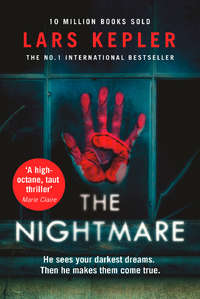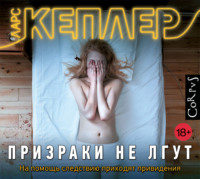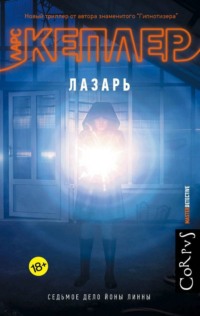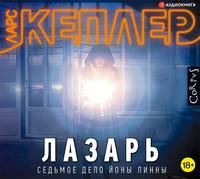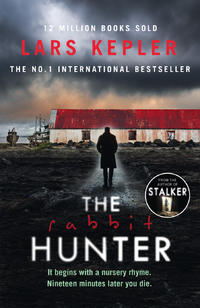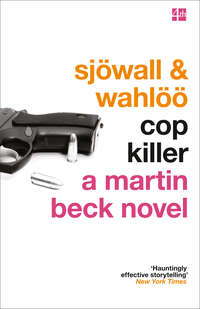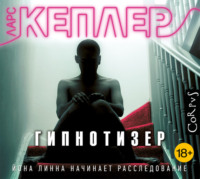
Полная версия
The Fire Witness
When she looks up again she sees something incomprehensible. An animal has got up onto two legs and is walking along the logging track, staggering and hunched over.
A thick figure covered in dirt, blood, and mud.
Pia holds her breath.
It isn’t an animal, it’s as if part of the forest has broken free and come to life.
Like a small girl made of twigs.
The apparition stumbles, but keeps walking towards the barrier.
Pia gets up and follows it.
She tries to speak, but her voice has vanished.
A branch snaps beneath her foot.
Gentle rain has started to fall on the forest.
She moves slowly, as if in a nightmare: she doesn’t seem to be able to run.
Between the trees she sees that the being has already reached the car. Dirty scraps of cloth are wrapped around the wrists of the bizarre girl.
Pia stumbles out onto the logging track and sees the creature sweep her handbag from the seat, get in, and close the door.
‘Dante,’ she gasps.
The car roars into life, drives over her mobile phone and keyring, pulls out into the road, hits the railing between the carriageways, straightens up, and vanishes into the distance.
Whimpering to herself, Pia runs to the barrier, feeling how her whole body is shaking.
It’s incomprehensible. The mud creature came out of nowhere, suddenly it was just there, and now the car and her son are gone.
She ducks under the barrier and walks out into the big, empty road. She doesn’t scream, she doesn’t seem to be able to. The only sound is her ragged breathing.
23
The forest flickers past, and raindrops patter against the large windscreen. Danish lorry driver Mads Jensen can see a woman standing in the middle of the road two hundred metres away. He swears to himself and blows the horn. He sees her flinch at the noise, but she makes no attempt to get off the road. The driver sounds the horn again, and the woman takes a slow step forward, raises her chin, and looks up at the approaching lorry.
Mads Jensen brakes, and feels the heavy articulated trailer pushing against the old Fliegel cab. He presses the brake pedal harder, the drive-shaft creaks, and the whole vehicle shudders before finally coming to a stop.
The engine winds down, and the rumble from the pistons becomes more audible.
The woman just stands there, three metres from the front of the lorry. Only now does the driver see that she is dressed as a priest under her denim jacket. A small rectangle of her white collar stands out against her black shirt.
The woman’s face is open and remarkably pale. When their eyes meet through the windscreen, tears start to run down her cheeks.
Mads Jensen puts the hazard lights on and gets out of the cab. The engine is radiating heat and a strong smell of diesel. When he walks around to the front of the vehicle the woman is leaning against one of the headlamps, gasping for breath.
‘What’s happened?’ Mads asks.
She looks up at him, wide-eyed. The amber glare of the hazard lights pulses over her.
‘Do you need help?’ he asks.
She nods, and he tries to lead her around the cab. The rain is getting harder, and it’s quickly getting dark.
‘Has someone hurt you?’
She resists, then goes with him and climbs into the passenger seat. He closes the door behind her and hurries around to get in the driver’s seat.
‘I can’t stay here, I’m blocking the whole road,’ he explains. ‘I have to move, is that OK?’
She doesn’t answer, but he sets the truck moving and switches on the windscreen wipers.
‘Are you hurt?’ he asks.
She shakes her head and claps one hand over her mouth.
‘My son,’ she whispers. ‘My …’
‘What are you saying?’ he asks. ‘What’s happened?’
‘She took my son …’
‘I’ll call the police. Is it OK if I call the police?’
‘Oh, God,’ she moans.
24
The rain is beating hard against the windscreen, the wiper blades are moving fast, and the road ahead of them looks as if it’s boiling.
Pia is sitting in the warm cab high above the ground, shaking. She can’t calm down. She realises that she’s not making any sense, but now she can hear the lorry driver talk to the emergency call centre. He is advised to carry on along Highway 86, then the 330, where he’ll meet an emergency vehicle at Timrå that will take her to Sundsvall Hospital.
‘What? What are you talking about?’ Pia asks. ‘This isn’t about me. They have to stop my car, that’s the only thing that matters.’
The Danish driver gives her a confused look, and she realises that she needs to concentrate to make herself understood. She has to act calmly even though the ground has disappeared beneath her, even though she’s in free-fall.
‘My son has been kidnapped,’ she says.
‘She says her son’s been kidnapped,’ the driver repeats into his phone.
‘The police have to stop the car,’ she goes on. ‘A Toyota … a red Toyota Auris. I can’t remember the licence number, but …’
The driver asks the emergency operator to wait.
‘It’s ahead of us on this road … you have to stop it … my son’s only four, he was sitting in the back when I …’
He repeats her words to the operator, explains that he’s driving east along Highway 86, about forty kilometres from Timrå.
‘They have to hurry …’
The truck slows down and passes a bent-over traffic light, and drives across a roundabout. The trailer judders as the wheels roll over the kerb, then the truck accelerates past a white brick building, driving parallel to the river.
The emergency call centre puts the Danish driver through to a female police officer in a patrol car. She introduces herself as Mirja Zlatnek, and says she’s thirty kilometres away, on Highway 330 in Djupängen.
Pia Abrahamsson takes the phone, swallows hard to stifle the nausea she feels. She hears her own voice, calm but shaky.
‘Listen,’ she says. ‘My son’s been kidnapped, and the car is driving along … hang on …’
She turns to the driver.
‘Where are we? What road are we on?’
‘Highway 86,’ the driver says.
‘How much of a head start did they get?’ the police officer asks.
‘I don’t know,’ Pia says. ‘Five minutes, maybe?’
‘Have you passed Indal?’
‘Indal,’ Pia repeats.
‘We’re almost twenty kilometres from there,’ the driver says loudly.
‘Then we’ve got them,’ the police officer says. ‘There are no alternative routes …’
When Pia Abrahamsson hears those words her tears start to flow. She quickly wipes her cheeks and hears the police officer talk to a colleague. They’re going to set up roadblocks on Highway 330 and on the bridge over the river. The second police officer is in Nordansjö, and says he can be in position in less than five minutes.
‘That’s good enough,’ the policewoman says quickly.
The truck drives along the winding road as it follows the river through a sparsely populated part of Medelpad. Even though they can’t see it, they’re following the car with Pia Abrahamsson’s four-year-old son in it: they know it must be ahead of them, because there are no other options. Highway 86 passes through a few isolated communities, but there are no side roads, just forest tracks that don’t connect to other roads, and only lead into the forest, stretching many kilometres through boggy land to logging areas, but no further.
‘I can’t bear this,’ Pia whispers.
The road they’re on splits in two ten kilometres ahead of them. Just past the little town of Indal, one branch of the road crosses the river and carries on almost due south, while the other goes on following the river towards the coast.
Pia sits with her hands clasped tightly, praying to God. Up ahead, two police cars have set up roadblocks on the two branches of the road. One car is parked at the far end of the bridge, and the other is eight kilometres to the east.
The truck carrying the Danish truck driver and Pia Abrahamsson is passing through Indal. Through the heavy rain they see the empty bridge over the teeming water, and the blue lights of the lone police car rotating at the far end of the bridge.
25
Police Constable Mirja Zlatnek has parked her patrol car across the whole width of the road. If any car wanted to get past, it would have to pull off the road and drive with two wheels in the ditch.
In front of her is a long, straight stretch of road. The police car’s blue lights flash across the wet tarmac and dark branches of the trees, in among the trunks.
The rain is beating hard on the car roof.
Mirja sits quietly for a while looking out through the windscreen and trying to think through the situation.
Visibility is poor because of the rain.
She had counted on having a very quiet day, seeing as almost all her colleagues in the whole district are busy with the case of the dead girl at the Birgitta Home. Even the National Crime Unit have been brought into the investigation.
Mirja has been developing a secret fear of the operational side of the job, without ever actually having been in any particularly traumatic situations. Perhaps it’s because of that time she tried to mediate in a domestic drama that ended badly, but that was many years ago now.
The anxiety has crept up on her. She prefers administrative duties, and crime prevention work.
She spent the morning sitting at her desk looking at recipes online. Elk fillet wrapped in pastry, potato wedges, and cream sauce with penny bun mushrooms. And puréed artichoke hearts.
She was in the car heading to Djupängen to look at a stolen trailer when the call came through about the abducted boy.
Mirja tells herself that she’s going to be able to solve the situation of the kidnapped boy. Because the car containing the woman’s four-year-old son has nowhere else to go.
This stretch of road is like a long tunnel, a trap.
The lorry is following it from the other direction.
Either the car containing the boy crosses the bridge just after Indal, where her colleague Lasse Bengtsson has blocked the road.
Or it comes this way, and I’m waiting here, Mirja thinks.
And ten kilometres behind the car is the lorry.
Obviously it all depends how fast the car is driving, but within the next twenty minutes there’ll be some sort of confrontation.
Mirja tells herself that the child almost certainly hasn’t been kidnapped in the real sense of the word. Probably a custody dispute. The woman she spoke to was too upset to give her any coherent information, but from what she did say her car must be somewhere on the road this side of Nilsböle.
It’ll soon be over, she tells herself.
It won’t be long before she can go back to her room at the station, get a cup of coffee and a ham sandwich.
But at the same time there’s something worrying her. The woman spoke about a girl with arms like twigs.
Mirja didn’t ask her name. There hadn’t been time. She assumed the emergency call centre had taken all the relevant details.
The fear in her voice had been alarming. She had been breathing fast, and described what she’d been through as incomprehensible, beyond logical explanation.
The rain is bouncing off the windscreen and bonnet. Mirja reaches for the radio, waits a moment, then calls Lasse Bengtsson.
‘What’s happening?’ she asks.
‘Torrential rain, but not much else. No cars, not a single damn … Hang on, I can see a truck, a bloody big articulated truck heading down Highway 330.’
‘He’s the guy who called,’ Mirja says.
‘So where the hell’s the Toyota?’ Lasse says. ‘I’ve been here a quarter of an hour, so it’ll have to reach you in the next five minutes, unless some UFO has—’
‘Give me a moment,’ Mirja says quickly and ends the call to her colleague when she sees the distant light from two car headlamps.
26
Mirja Zlatnek gets out of her patrol car and hunches in the downpour. She squints at the car approaching through the heavy rain.
With one hand on her holstered pistol she walks towards the car, simultaneously holding her left hand up to make the driver stop.
The water coursing across the road and into the ditches by the side of the carriageway looks as if it’s bubbling.
Mirja sees the car slow down, and she sees her own shadow bounce along the road surrounded by the rotating blue light from behind her. She hears a call on the radio in the patrol car, but stays on the road. The voices on the comms radio are tinny, and there’s a lot of crackling, but the words are still clearly audible.
‘Hell of a lot of blood,’ a younger colleague is saying as he describes the discovery of a second body at the Birgitta Home, a middle-aged woman.
The car comes closer, driving slowly, then pulls over to the edge of the road and stops. Mirja Zlatnek starts to walk towards it. It’s a Mazda pickup with muddy tyres. The driver’s door opens, and a large man in a green hunting jacket and a Helly Hansen sweater gets out. He has neatly combed shoulder-length hair, and a wide face with a large nose and narrow eyes.
‘Are you alone in the car?’ Mirja shouts, wiping the water from her face.
He nods, then looks over at the forest.
‘Stay back,’ she says as he walks closer.
He takes a tiny step back.
Mirja leans forward to look inside the car. Water trickles down the back of her neck.
It’s hard to see anything through the rain and mud on the windscreen. There’s a newspaper spread out on the driver’s seat. He’s been sitting on it while he was driving. She walks around and moves closer, trying to see what’s lying on the narrow back seat. An old blanket and a thermos flask.
The radio in the car crackles again, but she can no longer hear the words.
The shoulders of the man’s hunting jacket are already dark from the rain. There’s a sound of something scraping against metal coming from the vehicle.
When she looks back at the man again she sees he’s come closer. Just a little, one step, perhaps. Unless she’s imagining it. She’s no longer sure. He’s staring at her, looks her up and down, and then frowns.
‘Do you live here?’ she asks.
She rubs the mud from the licence plate with her foot, makes a note of it, then carries on around the pickup.
There’s a pink sports bag on the floor in front of the passenger seat. Mirja keeps moving around the vehicle, but keeps the big man in sight the whole time. There’s something on the back of the pickup under a green tarpaulin, held down by thick straps.
‘Where are you going?’ she asks.
He’s standing still, following her with his eyes. Suddenly some blood seeps out from under the tarpaulin, along the dirty grooves.
‘What have you got here?’ she asks.
When he doesn’t answer, she reaches over the back of the pickup. It isn’t easy to reach, she has to lean on the vehicle. The man moves sideways slightly. She managed to reach the tarpaulin with her fingertips without taking her eyes off the man. He licks his lips as she lifts it. She unfastens her pistol, then glances quickly at the back of the pickup, long enough to see the hoof of a young deer.
The man is standing completely still in the flashing blue light, but Mirja keeps her hand on her pistol as she steps back from the vehicle.
‘Where did you shoot the deer?’
‘It was lying on the road,’ he says.
‘Did you make a note of where?’
He spits slowly on the road, between his own feet.
‘Can I see your driving licence?’ she says.
He doesn’t answer, and shows no sign of obeying her.
‘Driving licence,’ she repeats, aware of the uncertainty in her own voice.
‘We’re done here,’ he says, and walks towards the pickup.
‘You’re legally obliged to report accidents involving wild animals …’
The man gets in the driver’s seat, closes the door, starts the engine, and pulls away. She watches him pass the police car with two wheels in the ditch. When he drives up onto the road again Mirja tells herself she should have examined the pickup more closely, should have removed the whole tarpaulin, and looked under the blanket on the back seat.
The rain is lashing the trees around her, and in the distance a crow calls from a treetop.
Mirja starts when she hears the sound of a heavy vehicle behind her. She turns around and pulls out her pistol, but can’t see anything except the rain.
27
Danish lorry driver Mads Jansen is being reprimanded over the phone by his transport manager. He blushes as he tries to explain the situation. Pia Abrahamsson can hear the angry voice through the phone, and the transport manager goes on yelling about coordinates and fucked-up logistics.
‘But,’ Mads Jensen tries to say, ‘surely we have to help other—’
‘This’ll be deducted from your wages,’ his boss snaps. ‘That’s all the help you’re getting from me.’
‘Thanks a lot,’ Mads says, and ends the call.
Pia sits beside the driver in silence as the dense forest flies past on both sides. The heavy rain sounds deafening in the cab. In the split wing mirror Pia can see the swaying trailer and the trees they’ve just passed.
Mads pops some nicotine gum in his mouth and stares ahead at the road. The sound of the engine and the thud of the heavy wheels on the tarmac blur into one.
She looks at the calendar that sways with the motion of the cab. A curvaceous woman holding an inflatable swan in a swimming pool. At the bottom of the glossy photograph the date is given as August 1968.
The road slopes downward, and the weight of the cargo of iron bars increases the speed of the vehicle.
Far off in the groove between the trees a strong blue light is flickering in the grey rain. A police car is blocking the road.
Pia Abrahamsson feels her heart start to beat hard and fast. She stares at the police car and the woman in the dark blue sweater waving her arm at them. Before the truck has stopped, Pia opens the door. The sound of the engine and the tyres becomes instantly much louder.
She feels dizzy as she clambers down and hurries over to the waiting police officer.
‘Where’s the car?’ the police officer asks.
‘What? What are you saying?’
Pia stares at the other woman and tries to read her face, but just gets more shaken by her serious expression. She feels as if her legs are going to give way beneath her.
‘Did you see the car when you passed it?’ the police woman clarifies.
‘Passed it?’ Pia says weakly.
Mads Jensen walks over to them.
‘We haven’t seen anything,’ he tells the police officer. ‘You must have set up the roadblock too late.’
‘Too late? I drove up this road to get here …’
‘So where the hell is the car?’ he asks.
Mirja Zlatnek runs back to her car and calls her colleague.
‘Lasse?’ she says urgently.
‘I’ve been trying to get you,’ he says. ‘You weren’t answering.’
‘No, I was—’
‘Has everything gone OK?’ he asks.
‘Where the hell’s the car?’ she asks, almost shouting. ‘The truck’s here, but there’s no sign of the car.’
‘There aren’t any other roads,’ he says.
‘We need to put an alert out and block the 86 in the other direction.’
‘I’ll get onto that at once,’ he says, and ends the call.
Pia Abrahamsson has come over to the police car. The rain has soaked her clothes. Police Constable Mirja Zlatnek is sitting in the driver’s seat with the door open.
‘You told me you were going to get him,’ Pia says.
‘Yes, I—’
‘You told me, I believed you when you said that.’
‘I know, I don’t understand this,’ Mirja says. ‘It doesn’t make sense, you can’t drive fast on these roads, there’s no way the car could have got to the bridge before Lasse got there.’
‘It has to be somewhere,’ Pia says in a hard voice, pulling her priest’s collar from her shirt.
‘Hang on,’ Mirja Zlatnek suddenly says.
She calls the command centre.
‘This is patrol car 321,’ she says quickly. ‘We need another roadblock, at once … Before Aspen … There’s a small road there, if you know the way, you can get from Kävsta up to Myckelsjö … Yes, exactly … Who? Good, he’ll be there in eight, ten minutes …’
Mirja gets out of the car and looks along the straight road, as if she still expects the Toyota to appear.
‘My boy – he’s gone?’ Pia asks her.
‘There’s nowhere they could have gone,’ Mirja says, doing her best to sound patient. ‘I understand that you’re worried, but we’ll get them – they must have turned off and stopped somewhere, but there’s nowhere they can go …’
She falls silent and wipes the rain from her forehead, takes a deep breath, and goes on: ‘We’ll closing off the last roads, and we’re calling in a helicopter …’
Pia undoes the top button of her shirt and leans one hand on the bonnet of the police car. She’s breathing far too heavily, and tries to calm down, her chest is pounding. She knows she ought to be making demands, but she can’t think clearly, can only feel a desperate fear and confusion.
28
Although the rain is still pouring from the sky, only a few drops manage to reach the ground between the trees in the forest.
A large white command vehicle is parked in the rain at the centre of the yard between the Birgitta Home’s buildings. The bus contains a coordination centre, and a group of men and women are seated around a table covered with maps and computers.
Their discussion of the ongoing murder investigation is interrupted as they listen to the radio communication about a boy who’s been abducted. Roadblocks have been set up on Highway 330, and at the bridge at Indal, as well as at Kävsta and further north on Highway 86. At first their colleagues sound confident of stopping the vehicle, but then everything goes quiet. No communication for ten minutes, until the radio suddenly crackles again and an officer reports breathlessly: ‘It’s gone, the car’s gone … it should be here, but it hasn’t turned up … We shut off every damn road there is, but it’s still vanished … I don’t know what to do,’ Mirja says wearily. ‘The mother’s sitting in my car, I’ll try and talk to her …’
The police officers have sat in silence as they listen to the exchanges. Now they gather around the map on the table, as Bosse Norling points out Highway 86 with his finger.
‘If they blocked the road here and here, the car can’t just disappear,’ he says. ‘Obviously it could have driven into a garage in Bäck or Bjällsta … or up one of the logging trails, but it’s still bloody weird.’
‘And they won’t get anywhere,’ Sonja Rask says.
‘Am I the only one thinking that Vicky Bennet might have taken the car?’ Bosse asks tentatively.
The pattering on the roof has grown quieter, but rain is still running down the bus’s windows.
Sonja sits down at the computer and uses the police intranet to check the databases of people with a criminal record, people who’ve been suspected of committing a crime, and ongoing custody disputes.
‘In nine times out of ten,’ Gunnarsson says, leaning back and peeling a banana, ‘problems like this sort themselves out of their own accord … I think she had her bloke in the car, they had an argument, and in the end he’d had enough and dumped her at the side of the road before taking off with the kid.’
‘She’s not married,’ Sonja says.
‘According to the statistics,’ Gunnarsson goes on in the same lecturing tone, ‘the majority of children in Sweden are now born out of wedlock.’
‘Here it is,’ Sonya says, interrupting. ‘Pia Abrahamsson sought sole custody of her son Dante, and the father has tried to lodge an appeal …’




